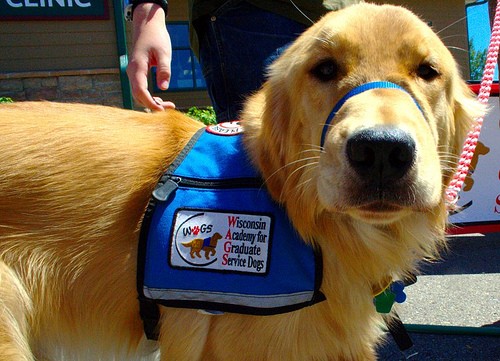The question of whether guide dogs and service animals are ethical is a complex one. While society often views assistance for people with disabilities as inherently virtuous, a deeper examination reveals potential ethical concerns regarding the exploitation of animals.
The Argument for Service Animals
Service dogs provide invaluable support to individuals with disabilities, enabling independence and improving quality of life. They can assist with navigation, alert to sounds, provide emotional support, and perform various tasks that enhance their handler’s safety and well-being. Many argue that the benefits to disabled individuals outweigh any potential harm to the animals. This viewpoint is often reinforced by the perception that dogs “love” to serve humans, creating a seemingly mutually beneficial relationship.
Questioning Domestication and Consent
However, the ethics of using guide dogs and other service animals are challenged by the inherent power imbalance in the relationship between humans and domesticated animals. Domestication itself raises questions of consent, as animals are bred and trained for specific purposes, often without regard for their individual needs or desires.
Service animals are typically purpose-bred and rigorously trained from puppyhood, dedicating their lives to serving their handlers. This can involve long hours of work, restricted freedom, and limited opportunities for social interaction with other dogs. While some dogs may thrive in this environment, it’s crucial to consider whether their well-being is truly prioritized.
Human Supremacy and Exploitation
The ideology of human supremacy plays a significant role in justifying the use of service animals. It’s easy to overlook the potential for exploitation when we view animals as existing primarily to serve human needs. Critics argue that using animals for our benefit, regardless of how “humane” the treatment may be, perpetuates a system of inequality.
Intersectionality and Social Justice
It is crucial to consider the broader social context when evaluating the ethics of service animal use. Just as it’s important to question the exploitation of vulnerable individuals in other contexts, such as prostitution, we should critically examine the power dynamics inherent in the relationship between humans and service animals. An intersectional framework helps us recognize that even individuals with disabilities can hold social privilege and that focusing solely on disability can obscure other forms of injustice.
Alternatives to Service Animals
Exploring alternatives to service animals is essential. While service dogs are valuable, human assistants and technological advancements can also provide support and promote independence for people with disabilities. These alternatives may offer more ethical and sustainable solutions in the long run.
The Fate of “Retired” Service Animals
The fate of service animals after their working lives also raises ethical concerns. While some are adopted into loving homes, others may end up in shelters, facing an uncertain future. This highlights the need for greater responsibility in ensuring the well-being of service animals throughout their lives.
Social Isolation and Human Interaction
Moreover, the reliance on service dogs can inadvertently contribute to social isolation for people with disabilities. The focus on independence and the discouragement of interaction with service dogs can create barriers to human connection and support.
Conclusion: A Call for Critical Reflection
The question of whether guide dogs are unethical is not easily answered. While service animals undoubtedly provide significant benefits to individuals with disabilities, it is essential to critically examine the ethical implications of their use. By acknowledging the potential for exploitation and exploring alternative solutions, we can strive towards a more just and compassionate society for both humans and animals.

